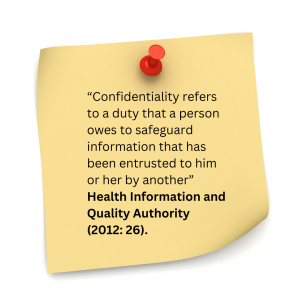Chapter 11 – Noelle Reilly (D1SOP11)
Domain 1 Standard of Proficiency 11
Understand confidentiality in the context of the team setting
|
KEY TERMS Relevant legislation Confidentiality Team settings
|
Social care is … professionals from an array of backgrounds providing support to vulnerable groups and individuals who are marginalised, disadvantaged or have additional requirements to help them achieve their potential. |
 This chapter explores the concept of confidentiality in a team setting with a focus on the legal, ethical and regulatory framework, through a case study based in a residential care setting. It is important that service users and their families have confidence in the staff and the service provided to them. Service users and their families expect that their privacy and confidentiality is respected (HSE 2018). Social care workers often work as part of a multi-disciplinary team, and confidentiality can pose particular challenges when information has to be shared with other agencies. If confidentiality is understood and evident in day-to-day practice in a team setting, it contributes to effective relationships between professionals and service users.
This chapter explores the concept of confidentiality in a team setting with a focus on the legal, ethical and regulatory framework, through a case study based in a residential care setting. It is important that service users and their families have confidence in the staff and the service provided to them. Service users and their families expect that their privacy and confidentiality is respected (HSE 2018). Social care workers often work as part of a multi-disciplinary team, and confidentiality can pose particular challenges when information has to be shared with other agencies. If confidentiality is understood and evident in day-to-day practice in a team setting, it contributes to effective relationships between professionals and service users.
Relevant Legislation
The Data Protection Acts 1998 and 2003 place obligations on all organisations to safeguard the rights of individuals in relation to the processing of their personal data. Under the Data Protection Acts a person’s data may only be used or disclosed for the purpose for which it was collected or for a directly related purpose. In addition, under the Freedom of Information Act 2014, all persons have the right to access information held by public bodies about them to the greatest possible extent, consistent with the public interest and the right to privacy (HSE 2021). Coupled with the Irish legislative framework, social care workers must adhere to the Code of Professional Conduct and Ethics for Social Care Workers, which is explicit in terms of acceptable behaviour related to confidentiality and privacy:
Part 2. Respect the Confidentiality and Privacy Of Service Users
2.1 You must:
a) Keep service user information securely and, subject to other provisions of this Code, treat it confidentially, including guarding it against accidental disclosure.
b) Share service user information with others only where and to the extent necessary to give safe and effective care or where disclosure is mandated by law.
c) Inform service users of the limits of confidentiality and the circumstances in which their information may be shared with others.
d) Obtain the consent of a service user before discussing confidential information with their family, carers, friends or other professionals involved in his/her care.
e) Always follow employer guidelines and relevant legislation when handling service user information.
f) Always follow best practice in relation to the use of service user information in clinical audits, quality assurance, education, training and research.
2.2 You should:
a) Continue to treat service user information as confidential even after the death of the service user.
b) Be aware of the following circumstances in which disclosure of confidential information in the absence of consent may be appropriate, justifiable and/or required by law: to prevent harm to the service user or a third party to prevent harm to the public at large to comply with a legal requirement.
c) Inform the service user of the disclosure unless this would cause them serious harm or put the health, safety or welfare of a third party at risk.
d) Where you decide that disclosure is justified, you should ensure that the disclosure is made to an appropriate person or organisation, and that the extent of the disclosure is minimized to relevant information. (SCWRB 2019)
It is clear that confidentiality is an important legal and ethical duty of social care workers. In addition to the legal and ethical frameworks discussed, children’s residential centres must comply with the National Standards for Children’s Residential Centres.
Arrangements are in place for sharing and transferring information in an efficient and timely manner to support effective decision-making. These arrangements clearly outline who staff share personal information with, in the best interest of each individual child, and the manner in which this is done to protect the privacy and confidentiality of the child the information relates to (HIQA 2018).
TASK 1
Write something personal on a piece of paper and put in an envelope. Give it to a friend. Ask them to hand the envelope around a group of their friends, with each person minding the envelope for a couple of days. Then the original person gives the envelope back to you unopened.
- How do you feel about completing this task?
- What thoughts come into your mind knowing that private information belonging to you is being shared among a group of people, some of whom you do not know?
- What was it like to think that other people had access to your personal data?
- How did you feel when the envelope came back to you unopened?
TASK 2
You are an employee working in a mainstream residential centre. One of the young residents in the centre (Ciara, aged 14) tells you that she has been hanging out with a boy in her class during school and she would like to meet him during her free time. They are ‘just friends’, but she thinks she would like to get to know him better. Ciara asks you not to tell everyone on the team because she is a bit embarrassed about her feelings for the boy and does not want everyone to know that she fancies him. You are from the area and have heard rumours that this boy’s extended family are engaged in criminal behaviour, although you do not know the boy himself.
- What do you say to Ciara?
- Who do you tell? What do you record?
- Which information from this case study is accurate and factual?
- What are the limits of confidentiality in this scenario?
Discussion
The following analysis is based on Task 2. There are multiple variations depending on a range of factors. There is no ‘one size fits all’ in social care. Below is one possible team response to the case study which incorporates legislative, ethical and regulatory factors, but is not absolute.
- Explain to Ciara that it is normal to feel a bit embarrassed about admitting that you fancy someone and thank her for telling you. However, remind her that in order to arrange for her to see the boy during free time you will need to speak to the team, and the social worker, so that free time can be discussed. This is also an opportunity to remind Ciara that there are no secrets in the team and that all information is shared within the team so that all the young people in the house are safe. Thank her for talking to you about it and assure her that her request will be discussed and that you will come back to her about it.
- Remind Ciara that everyone on the team will be respectful of the information and will not share it with others, unless it is feared that she might come to harm, for example if she did not adhere to the free time guidelines and they needed to go look for her.
- You cannot discuss your concerns regarding the young man with the resident as these are rumours and not based on fact. However, this information may contribute to the risk assessment or safety plan protocols until verified.
- The team, on being provided with the information, must not discuss this case outside the team setting unless Ciara becomes at risk, at which time it may become necessary to share information with specific professionals, for example An Garda Síochána or the school principal, depending on the nature of the concern.
- The team must adhere to guidance provided by Ciara’s social worker in terms of what information is shared with family members. This information will be available in Ciara’s care plan.
- Under Freedom of Information legislation, service users have access to their records, so if information has to be shared with other professionals it should be happen in a respectful and non-judgemental manner – it’s not what you say, it’s how you say it.
Paperwork to be completed:
- Young person’s log/daily record
- Risk assessment
- Social work contact
- Individual/key worker
- Minutes of team meeting
- Updated absence management plan
Over to you
- Does anything else come to mind?
- Are there other factors to be considered?
- How might this scenario be managed in your setting?
- Would you handle it in a different way?
![]() Tips for Practice Educators
Tips for Practice Educators
- Write a fictional case study for your service and ask the team to provide possible solutions.
- In relation to TASK 2 – in supervision, tell your student what approach you would take and why.
References
HIQA (Health Information and Quality Authority) (2012) National Standards for Safer Better Healthcare (online) <https://www.hiqa.ie/reports-and-publications/standard/national-standards-safer-better- healthcare> (accessed 22 March 2020).
HIQA (2018) National Standards for Children’s Residential Centres (online) <https://www.hiqa.ie/reports-and- publications/standard/national-standards-childrens-residential-centres> (accessed 22 March 2020).
HSE (Health Service Executive) (2018), Confidentiality and Consent (online) <https://www.hse.ie/eng/ about/qavd/complaints/ysysguidance/supporting-the-service-user/confidentialityconsent.html> (accessed 15 March 2020).
Social Care Workers Registration Board (2019) Social Care Workers Registration Board code of professional conduct and ethics. Dublin: CORU Health and Social Care Regulator. Available at https://coru.ie/files-codes-of-conduct/scwrb-code-of-professional-conduct-and-ethics-for- social-care-workers.pdf

